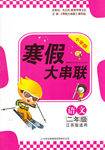题目内容
.
______is mentioned above, the number of the students in senior schools is increasing.
| A.Which | B.As | C.That | D.It |
B
解析

练习册系列答案
 寒假大串联黄山书社系列答案
寒假大串联黄山书社系列答案
相关题目
题目内容
.
______is mentioned above, the number of the students in senior schools is increasing.
| A.Which | B.As | C.That | D.It |
B
解析

 寒假大串联黄山书社系列答案
寒假大串联黄山书社系列答案